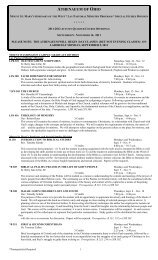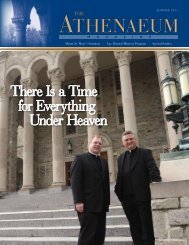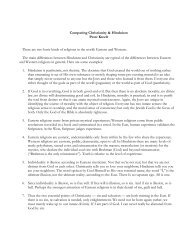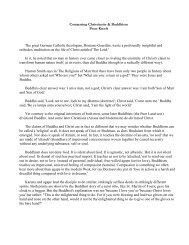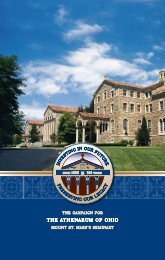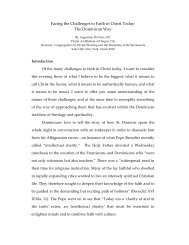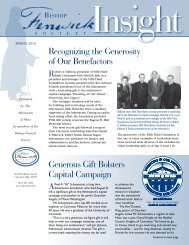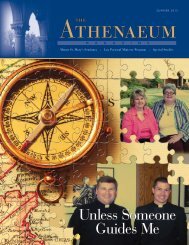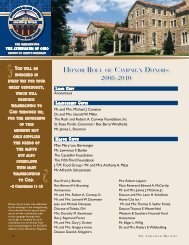Notes from Gathered for the Journey Six (6) essays David McCarthy
Notes from Gathered for the Journey Six (6) essays David McCarthy
Notes from Gathered for the Journey Six (6) essays David McCarthy
Create successful ePaper yourself
Turn your PDF publications into a flip-book with our unique Google optimized e-Paper software.
Michael R. Miller ―Freedom and ―Grace‖pp. 177-197.IntroductionThomas Aquinas cautions moderation in worldly virtues. In this he follows his mentorAristotle.But, Thomas exhorts one in living <strong>the</strong> extreme of <strong>the</strong> <strong>the</strong>ological virtues. (177)Does this invite extremism—causing possible harm to o<strong>the</strong>rs? (religiousfanaticism) –i.e. Muslim extremists killing over 3000 innocent persons?Does it somehow thwart or limit human freedom?Miller quotes critics who would assert that ―deeply religious people are <strong>for</strong>ced by <strong>the</strong>irfaith commitment to live a certain kind of life, and hence cannot find true personalsatisfaction because <strong>the</strong>ir extreme faith severely restricts both <strong>the</strong> scope and possibleattainment of <strong>the</strong>ir desires.‖ (178)Aquinas and GraceAquinas valued <strong>the</strong> infused <strong>the</strong>ological virtues –―because he understood that <strong>the</strong>ytrans<strong>for</strong>m <strong>the</strong> lives of those who possess <strong>the</strong>m, shaping our character and directing ustoward union with God.‖ (178)―..this trans<strong>for</strong>mation does not destroy our freedom but fulfills it.‖ (178)Like a ballet step—a pas de deux between God‘s grace and human freedom.Note: Miller presumes philosophy of <strong>the</strong> human good—an ethics built upon a ―thick―vision of ―what brings human fulfillment.‖ In this he is characteristically Aristotelian-Thomistic.I. Theological VirtuesGeneral observation: ―All people are disposed to act in particular ways when presentedwith a choice. Over time <strong>the</strong>se dispositions help shape our capacity to act in one way orano<strong>the</strong>r, which in turn accounts <strong>for</strong> <strong>the</strong> kind of person we will be.‖ (178)Impatient? – settle <strong>for</strong> <strong>the</strong> first ―good‖ that comes your way; lack perseverance to developtalents <strong>for</strong> a greater, more profound good.This tendency ―to decline to perfect your talents‖ makes it more difficult ―to orientyourself toward <strong>the</strong> good; your bad dispositions are rein<strong>for</strong>ced and your impatiencebecomes a vice, at tendency to reject what bring human fulfillment.‖ (178)Virtues give us ―a steady aim at <strong>the</strong> good.‖ (179)—Importantly, virtues may ―shape ourcapacity <strong>for</strong> <strong>the</strong> good‖ but <strong>the</strong>y ―do not necessarily free us <strong>from</strong> hard work or <strong>the</strong>possibility of failure.‖ (179)Fundamental Moral Theology Page 26 of 54Class <strong>Notes</strong> – Fa<strong>the</strong>r Michael Seger



